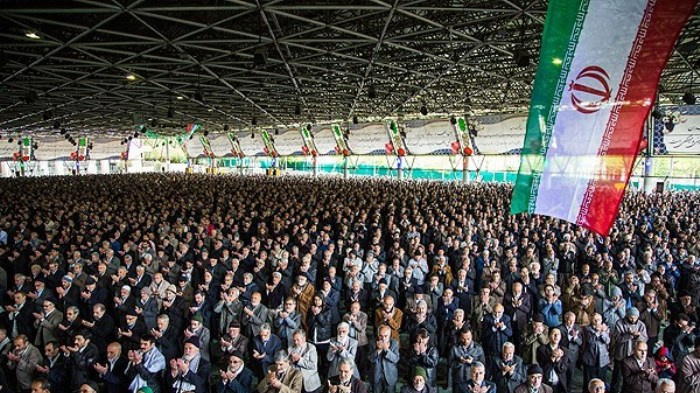Friday Prayers across Iran: Elections, economy and missiles

(Tehran's Friday prayers. Photo: Vahid Naderi/Fars)
Friday prayers of this week mainly revolved around economy, following Supreme Leader Ayatollah Khamenei’s designation of the Iranian year of 1395 as a year dedicated to “Economy of Resistance; Practical Steps and Action”.
In Tehran, Friday prayers' imam Kazem Seddighi told his audience that “the enemy views economy as an effective leverage. They want to prove that we [Iranians] should not have made a revolution to bear [economic] pressure,” Seddighi called ‘economy of resistance’ a third way between surrender to the enemy and sanctions.
“Resistance economy neutralizes sanctions and helps us not withdraw from our ideals and principles,” said Mohammad-Bagher Farzaneh in Mashhad. Farzaneh added that the main obstacle to realization of resistance economy is not external, i.e. the United States, but domestic, that is, “forces whose aims to gain power at any cost.” However, he did not clarify on his claim. In Shiraz, Abufazel Razavi Ardakani was more direct. Ardakani slammed the country’s banking system for its “ruthless conduct” against the resistance economy, pointing to the 25-30% interest rates collected by Iranian banks from industrial units which has led to their massive shutdown.
Back to Tehran, Kazem Seddighi also criticized the excessive excitement displayed by pro-government media and figures after their relative victory in the February parliamentary elections. “For an Islamic society, it is not suitable that some groups flex muscles and call themselves victors,” he complained. “Becoming arrogant for collecting a large number of votes is not a good sign for a society that claims spirituality.” Abufazel Razavi Ardakani, Friday prayers’ leader in Shiraz, also warned representative-elects not to harbor ‘infiltration’ plans. “They shouldn’t think that they will be able to do whatever they want by entering the parliament and showing the green light to the United States.”
Hashemi Rafsanjani’s recent comment on missiles, ("the world of tomorrow is a world of discourse, not missiles,") that faced thinly-veiled, strongly-worded criticism by Ayatollah Khamenei was also addressed by Friday prayers' sermonizers. “Those who say that the future of the world relies on negotiations and not missiles miss the fact that other countries do not stop their progress, particularly in defense affairs,” said Kazem Seddighi in Tehran. “Some officials believe that we should live under the command of non-believers.” In Shiraz, Friday prayers’ sermonizer Razavi Ardakani criticized the United States for planning new sanctions against Iran after its ballistic missile tests. “They want us to be a weak country” he said, “but our power will stop the enemy”.

